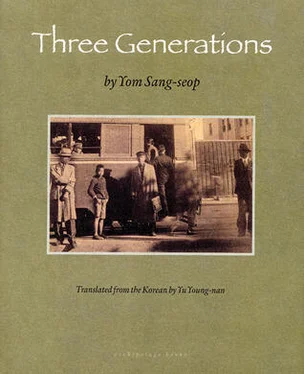Who would believe this woman is an employee at a hole-in-the-wall bar called Bacchus? Deok-gi thought, taking in Gyeong-ae decked out in her Western outfit. In the twilight, he couldn’t make out what she was wearing under her coat, but the dark orange overcoat, her fuzzy hat, and her pointed enameled shoes wouldn’t be out of place on a dance floor or a stage.
“Where is the child? Is it a very bad cold?” Deok-gi said after a while.
“At my mother’s in Changgol. It must be the flu. She’s been sick for three days, and it’s getting worse. If she’s going to die, I hope it happens sooner rather than later,” Gyeong-ae spat out.
Deok-gi took her to a Japanese noodle shop, thinking it would be less crowded there.
He had thought they would have a lot to discuss, but once they were finally sitting across from each other, there wasn’t much to say.
“Is everyone all right?” Gyeong-ae broke the ice.
“Yes.”
“Does your father still say ‘Amen’?” A sneer flickered over Gyeong-ae’s face.
“He does.” Deok-gi answered with an embarrassed smile. It caused him pain to talk about his father.
Gyeong-ae didn’t want anything from the menu, saying that she had already eaten. Deok-gi didn’t feel like eating a full meal in front of her, so he just ordered a bowl of noodles.
“How did you start working where you are now?” Deok-gi was dying to know.
“Why do you want to know?” Gyeong-ae smiled fleetingly, then added: “The proprietor is a friend of mine. She asked me to work with her because she’d never run a place like that before. I was bored so I went along. It’s fun.” She flashed another smile.
Deok-gi found it difficult to delve further into her affairs.
“How old is the child now? A daughter, right?”
“She’s five. If she were a boy, it would be more troublesome,” she answered without a hint of embarrassment. “That child, she’s a Jesus, a female Jesus.” She sneered.
“Why is that?”
“Because she doesn’t have a father.”
“Why?”
“She isn’t in your family registry, is she? Your father the Christian, the ‘pastor,’ won’t put her name there because it would sully the Jo family name.” As she spat out these words, a menacing look flitted across her face.
Deok-gi gulped down his noodles quickly; they left together.
“It’s a little out of the way, but do you want to stop by?” Gyeong-ae said as they went down Jingogae together. “I don’t want to say that I feel bad for her, but. ”
Gyeong-ae wanted to say, “but she does have the same blood as you.” She just couldn’t bring herself to say it.
Although Deok-gi understood what she meant, he didn’t respond right away. At first he thought that perhaps he could ignore the situation, or that at least there wouldn’t be any need for him to go and see the sick child, even if the day did come when he’d meet her as a grown-up. It was his father who should go and see her out of sincerity, affection, and loyalty. It wasn’t his place to make an impulsive appearance.
What does my father think about all this, and how responsible does he feel? If he doesn’t include her in our family registry, what’s going to happen to her when she’s an adult?
He felt sorry for Gyeong-ae and the half sister to whom he had yet to be introduced. The more he pitied the mother and daughter, the more he disapproved of his father.
“Maybe you know what happened and how I ended up like this. Whether you do or not, I could just leave it at that, and it probably isn’t something you should ask me about. I don’t want to argue about who’s right and who’s wrong. But why don’t you at least meet her once? It’s useless, if you give it serious thought, and I’m sure it’s a bother for you, but no one visits the poor thing, not even once a year. Though she’s still young, I feel sorry for her.” Gyeong-ae’s words were unexpectedly sentimental.
She’s an ordinary woman, a mother loyal to her family, Deok-gi thought, and he agreed with what she said.
“Unfortunately, I’m in a ridiculous and rather embarrassing position, but it might be a good idea for me to go and see her, as you say. Especially if my father doesn’t do anything for her. I mean, she was born a Jo, and if she has no one to look after her in ten or twenty years, I can’t ignore her then. But as long as you’re raising her, you’d better do a good job of it. If we ignored her and then tried to take care of her when it’s too late or who knows what, it’d only look bad.” Deok-gi stammered, feeling awkward about broaching the matter. What he said was intended in part as advice that she be careful not to taint the Jo family name.
Gyeong-ae walked along slowly as she listened, but she didn’t respond. Deok-gi struck her as mature for his age, and he was, to his credit, giving the matter of her child serious thought. She was grateful to him for that. Truth be told, she was taking him to see the child with every intention of entrusting her to him in lieu of his father. She was glad to learn, even before she brought up the subject, that the same idea had crossed Deok-gi’s mind.
If I get him to meet her and he visits her often, he won’t be able to turn his back on her!
Gyeong-ae’s house was in Bungmi Changjeong, down a long alley marked by many twists and turns. Deok-gi would have a hard time finding his way out.
“Did you bring medicine?” Gyeong-ae’s mother called impatiently as she came out to greet her, but on seeing Deok-gi, who was standing behind her daughter, she stopped short and stared.
The house was a tile-roofed building in fairly decent shape. Peering into the veranda, which was lit with electric lamps, Deok-gi surmised that this was not a household in need.
Who do they live with? Did my father set them up here?
Deok-gi followed Gyeong-ae onto the veranda. As soon as the child saw her mother, she began to fret, whining from the bed. She saw her mother once a day, but her mother rarely held her, so she didn’t ask to be picked up.
“Don’t cry, honey. Look who’s here! We’ve got a guest!” Gyeong-ae pointed to Deok-gi.
The child stared at the stranger and burst into tears.
“Now, now, our little Miss Jesus — our Christ!” The young mother took off her coat, hung it on the wall and sat down by the child, lifting her into her lap.
Deok-gi sat at the foot of the bedding on the warm part of the floor.
“This is your brother! Your brother! You said you wanted to see your father, didn’t you?” Gyeong-ae shifted the child in her arms so that Deok-gi could see her. Flushed with fever, the child stared at him, her teary eyes wide open in surprise. Then she buried her face in the crook of her mother’s arm.
“What’s the matter?” Gyeong-ae asked Deok-gi with a smile. “Were you expecting someone else?” She thought it was both funny and embarrassing that the word “brother” had rolled unhindered off her tongue. It sounded odd to Deok-gi’s ear, too.
Deok-gi thought the little girl looked clever and pretty. He knew he couldn’t keep sitting there without saying anything.
“She still seems a bit feverish. Why not use some Chinese medicine?” He looked at Gyeong-ae’s mother.
The mother looked stubborn but not coarse.
She had been sitting quietly sizing up Deok-gi, but seizing the opportunity opened up by his comment, she asked her daughter, “This gentleman is the eldest son?” She threw a quick glance in Deok-gi’s direction.
Gyeong-ae nodded and introduced her mother to Deok-gi. Then she mumbled in a teasing tone, “And yes, Mother, this gentleman is the eldest son.”
Her mother understood who he was when Gyeong-ae first used the word “brother.” Now her face clouded; she uttered an exclamatory remark and began to spout a stream of grievances. “How could that man just stop coming by all of a sudden? He could have at least shown some interest in how his child has been doing these past few years. After all, she does live in the same city. Has my daughter somehow become his enemy? I think that it’s just despicable the way he. ”
Читать дальше












